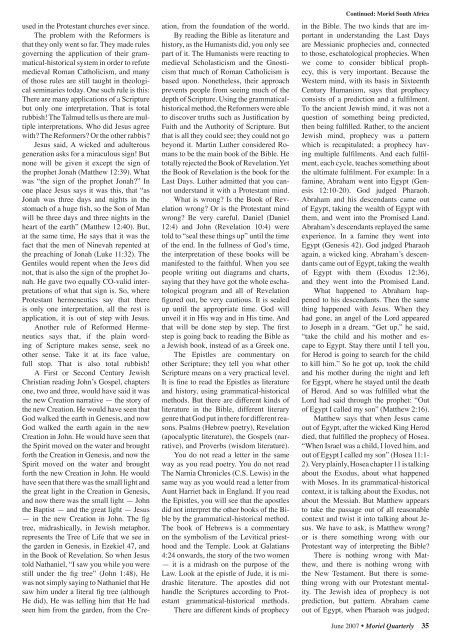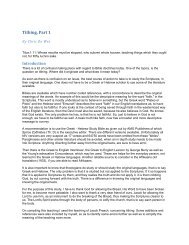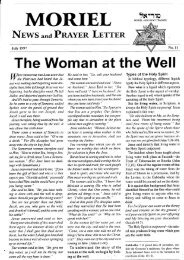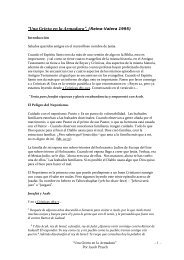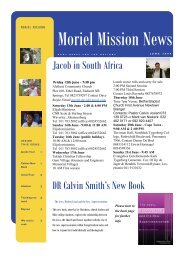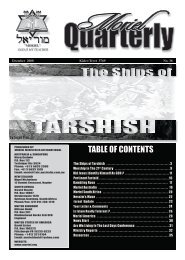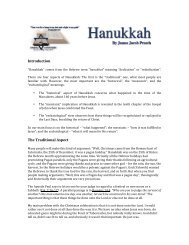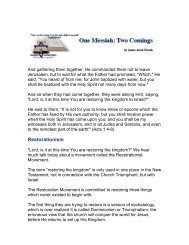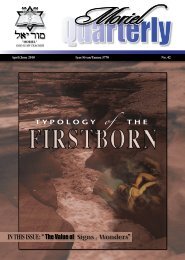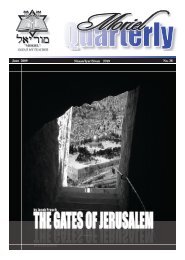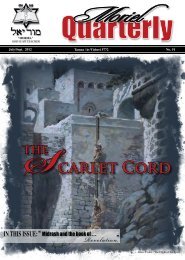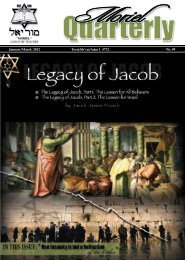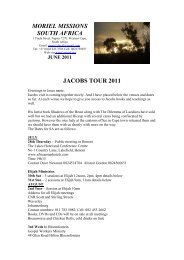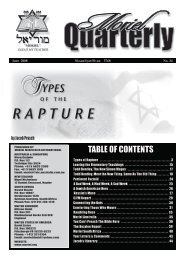Spiritual Warfare and Territorial Spirits (~5.5 MB) - Moriel Ministries
Spiritual Warfare and Territorial Spirits (~5.5 MB) - Moriel Ministries
Spiritual Warfare and Territorial Spirits (~5.5 MB) - Moriel Ministries
Create successful ePaper yourself
Turn your PDF publications into a flip-book with our unique Google optimized e-Paper software.
used in the Protestant churches ever since.The problem with the Reformers isthat they only went so far. They made rulesgoverning the application of their grammatical-historicalsystem in order to refutemedieval Roman Catholicism, <strong>and</strong> manyof those rules are still taught in theologicalseminaries today. One such rule is this:There are many applications of a Scripturebut only one interpretation. That is totalrubbish! The Talmud tells us there are multipleinterpretations. Who did Jesus agreewith? The Reformers? Or the other rabbis?Jesus said, A wicked <strong>and</strong> adulterousgeneration asks for a miraculous sign! Butnone will be given it except the sign ofthe prophet Jonah (Matthew 12:39). Whatwas “the sign of the prophet Jonah?” Inone place Jesus says it was this, that “asJonah was three days <strong>and</strong> nights in thestomach of a huge fish, so the Son of Manwill be three days <strong>and</strong> three nights in theheart of the earth” (Matthew 12:40). But,at the same time, He says that it was thefact that the men of Ninevah repented atthe preaching of Jonah (Luke 11:32). TheGentiles would repent when the Jews didnot, that is also the sign of the prophet Jonah.He gave two equally CO-valid interpretationsof what that sign is. So, whereProtestant hermeneutics say that thereis only one interpretation, all the rest isapplication, it is out of step with Jesus.Another rule of Reformed Hermeneuticssays that, if the plain wordingof Scripture makes sense, seek noother sense. Take it at its face value,full stop. That is also total rubbish!A First or Second Century JewishChristian reading John’s Gospel, chaptersone, two <strong>and</strong> three, would have said it wasthe new Creation narrative — the story ofthe new Creation. He would have seen thatGod walked the earth in Genesis, <strong>and</strong> nowGod walked the earth again in the newCreation in John. He would have seen thatthe Spirit moved on the water <strong>and</strong> broughtforth the Creation in Genesis, <strong>and</strong> now theSpirit moved on the water <strong>and</strong> broughtforth the new Creation in John. He wouldhave seen that there was the small light <strong>and</strong>the great light in the Creation in Genesis,<strong>and</strong> now there was the small light — Johnthe Baptist — <strong>and</strong> the great light — Jesus— in the new Creation in John. The figtree, midrashically, in Jewish metaphor,represents the Tree of Life that we see inthe garden in Genesis, in Ezekiel 47, <strong>and</strong>in the Book of Revelation. So when Jesustold Nathaniel, “I saw you while you werestill under the fig tree” (John 1:48), Hewas not simply saying to Nathaniel that Hesaw him under a literal fig tree (althoughHe did), He was telling him that He hadseen him from the garden, from the Creation,from the foundation of the world.By reading the Bible as literature <strong>and</strong>history, as the Humanists did, you only seepart of it. The Humanists were reacting tomedieval Scholasticism <strong>and</strong> the Gnosticismthat much of Roman Catholicism isbased upon. Nonetheless, their approachprevents people from seeing much of thedepth of Scripture. Using the grammaticalhistoricalmethod, the Reformers were ableto discover truths such as Justification byFaith <strong>and</strong> the Authority of Scripture. Butthat is all they could see; they could not gobeyond it. Martin Luther considered Romansto be the main book of the Bible. Hetotally rejected the Book of Revelation. Yetthe Book of Revelation is the book for theLast Days. Luther admitted that you cannotunderst<strong>and</strong> it with a Protestant mind.What is wrong? Is the Book of Revelationwrong? Or is the Protestant mindwrong? Be very careful. Daniel (Daniel12:4) <strong>and</strong> John (Revelation 10:4) weretold to “seal these things up” until the timeof the end. In the fullness of God’s time,the interpretation of these books will bemanifested to the faithful. When you seepeople writing out diagrams <strong>and</strong> charts,saying that they have got the whole eschatologicalprogram <strong>and</strong> all of Revelationfigured out, be very cautious. It is sealedup until the appropriate time. God willunveil it in His way <strong>and</strong> in His time. Andthat will be done step by step. The firststep is going back to reading the Bible asa Jewish book, instead of as a Greek one.The Epistles are commentary onother Scripture; they tell you what otherScripture means on a very practical level.It is fine to read the Epistles as literature<strong>and</strong> history, using grammatical-historicalmethods. But there are different kinds ofliterature in the Bible, different literarygenre that God put in there for different reasons.Psalms (Hebrew poetry), Revelation(apocalyptic literature), the Gospels (narrative),<strong>and</strong> Proverbs (wisdom literature).You do not read a letter in the sameway as you read poetry. You do not readThe Narnia Chronicles (C.S. Lewis) in thesame way as you would read a letter fromAunt Harriet back in Engl<strong>and</strong>. If you readthe Epistles, you will see that the apostlesdid not interpret the other books of the Bibleby the grammatical-historical method.The book of Hebrews is a commentaryon the symbolism of the Levitical priesthood<strong>and</strong> the Temple. Look at Galatians4:24 onwards, the story of the two women— it is a midrash on the purpose of theLaw. Look at the epistle of Jude, it is midrashicliterature. The apostles did noth<strong>and</strong>le the Scriptures according to Protestantgrammatical-historical methods.There are different kinds of prophecyContinued: <strong>Moriel</strong> South Africain the Bible. The two kinds that are importantin underst<strong>and</strong>ing the Last Daysare Messianic prophecies <strong>and</strong>, connectedto those, eschatological prophecies. Whenwe come to consider biblical prophecy,this is very important. Because theWestern mind, with its basis in SixteenthCentury Humanism, says that prophecyconsists of a prediction <strong>and</strong> a fulfilment.To the ancient Jewish mind, it was not aquestion of something being predicted,then being fulfilled. Rather, to the ancientJewish mind, prophecy was a patternwhich is recapitulated; a prophecy havingmultiple fulfilments. And each fulfilment,each cycle, teaches something aboutthe ultimate fulfilment. For example: In afamine, Abraham went into Egypt (Genesis12:10-20). God judged Pharaoh.Abraham <strong>and</strong> his descendants came outof Egypt, taking the wealth of Egypt withthem, <strong>and</strong> went into the Promised L<strong>and</strong>.Abraham’s descendants replayed the sameexperience. In a famine they went intoEgypt (Genesis 42). God judged Pharaohagain, a wicked king. Abraham’s descendantscame out of Egypt, taking the wealthof Egypt with them (Exodus 12:36),<strong>and</strong> they went into the Promised L<strong>and</strong>.What happened to Abraham happenedto his descendants. Then the samething happened with Jesus. When theyhad gone, an angel of the Lord appearedto Joseph in a dream. “Get up,” he said,“take the child <strong>and</strong> his mother <strong>and</strong> escapeto Egypt. Stay there until I tell you,for Herod is going to search for the childto kill him.” So he got up, took the child<strong>and</strong> his mother during the night <strong>and</strong> leftfor Egypt, where he stayed until the deathof Herod. And so was fulfilled what theLord had said through the prophet: “Outof Egypt I called my son” (Matthew 2:16).Matthew says that when Jesus cameout of Egypt, after the wicked King Heroddied, that fulfilled the prophecy of Hosea.“When Israel was a child, I loved him, <strong>and</strong>out of Egypt I called my son” (Hosea 11:1-2). Very plainly, Hosea chapter 11 is talkingabout the Exodus, about what happenedwith Moses. In its grammatical-historicalcontext, it is talking about the Exodus, notabout the Messiah. But Matthew appearsto take the passage out of all reasonablecontext <strong>and</strong> twist it into talking about Jesus.We have to ask, is Matthew wrong?or is there something wrong with ourProtestant way of interpreting the Bible?There is nothing wrong with Matthew,<strong>and</strong> there is nothing wrong withthe New Testament. But there is somethingwrong with our Protestant mentality.The Jewish idea of prophecy is notprediction, but pattern. Abraham cameout of Egypt, when Pharaoh was judged;June 2007 • <strong>Moriel</strong> Quarterly 35


